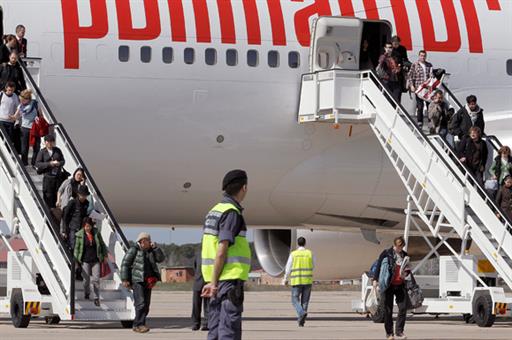The return of these Spanish citizens residing in Japan concludes an important part of the steps taken by the Government of Spain to attend, inform and transport the Spanish citizens who were in Japan on 11 March when the earthquake struck, leading to the subsequent tsunami and nuclear disaster.
Since day one, the Government of Spain has conveyed its solidarity and willingness to offer the Japanese Government any help it may require, has taken steps to attend to those Spanish citizens residing in the country and has gathered technical information on events at the Fukushima nuclear plant.
Regarding the latter, the President of the Government held at a meeting at Moncloa Palace with the President of the Nuclear Safety Council and, in the Lower House of Parliament, announced that the Government will ask for reports on safety at the nuclear plants in Spain in order "to reinforce confidence and safety conditions with even more demanding reports". The President of the Government stressed that the events at the Fukushima plant "must lead us to extract conclusions, but measured conclusions, conclusions with scientific guarantees".
In order to closely monitor events in Japan and to assist the Government in any decisions that may be required, the President of the Government decided to set up a group to monitor the situation, the first meeting of which was held on Wednesday 16 March at Moncloa Palace and at which it was confirmed that no Spanish citizens were in the exclusion zone.
As part of its job to provide information and attention, the Government has activated a specific information section on the website of the Ministry of Foreign Affairs for the Spanish community in Japan. The Ministry of Health has activated a protocol for people arriving from Japan and has also published a series of questions and answers for public dissemination about the nuclear crisis in Japan.
These steps have been accompanied by Government efforts to make resources available to those Spanish citizens residing in Japan who wish to leave the country. These efforts were announced at the second meeting of the group monitoring events and led to the departure from Japan of 157 people, of which approximately thirty are citizens from other countries - mainly from the European Union and Brazil.
During the sixth meeting of the Group Monitoring the Crisis in Japan on 22 March, the Government decided to increase the control measures being applied to products imported from Japan following the latest information confirmed by the Japanese Government regarding the presence of radioactive contamination in various products, especially milk and vegetables.
According to the data generated by the environmental radiation monitoring system, assessed by the Nuclear Safety Council, measured levels of radioactivity have so far remained strictly within normal limits and in no way represent a threat to public health or the environment. Considering the distance from the Fukushima nuclear plant, no significant changes are expected in these measurements on the European continent.





